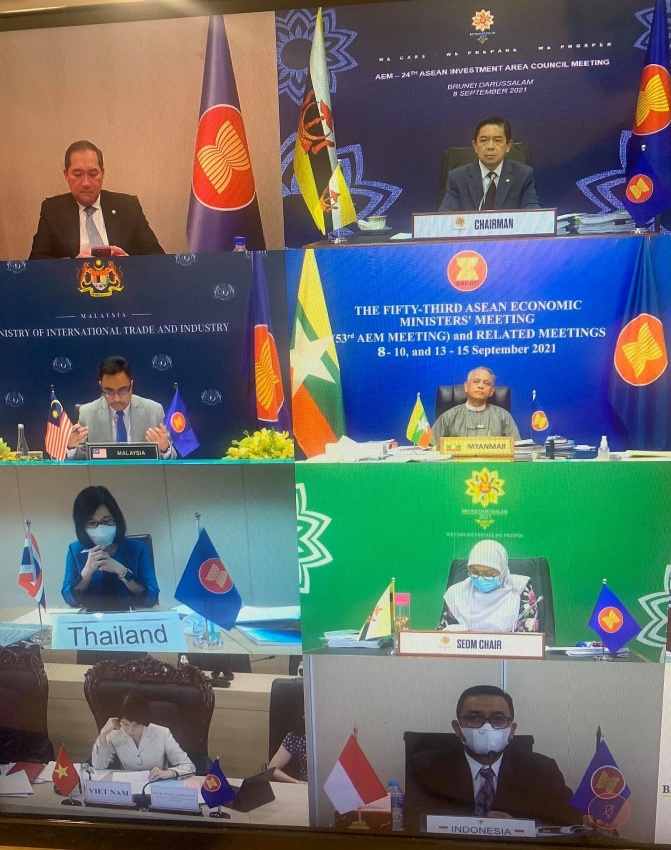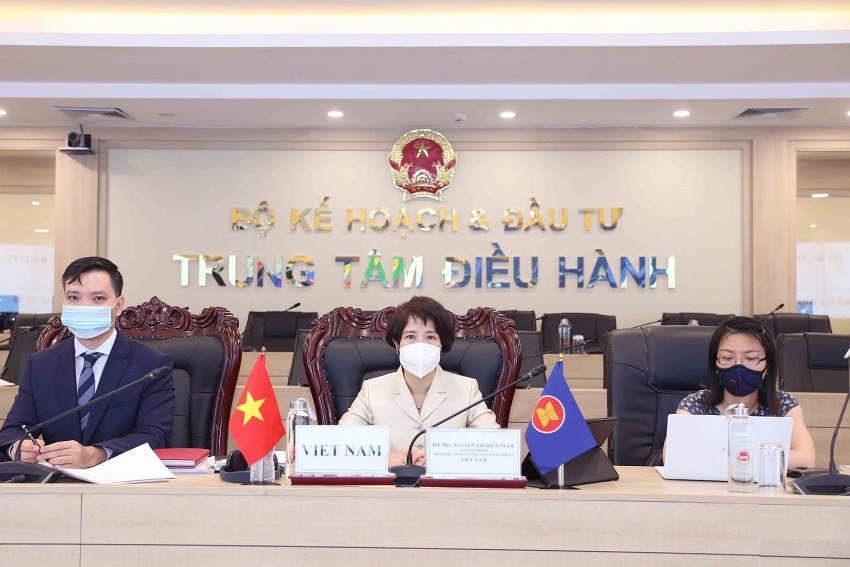ASEAN investment report 2020-2021: investing in Industry 4.0
 |
| Representatives from 10 ASEAN country members attended the ASEAN Economic Ministers' Meeting |
This year’s report features the role of foreign direct investment (FDI) in the region’s Industry 4.0 transformation and how member states are adopting Industry 4.0 technologies to step up industrialisation and economic development. It also provides policy options to attract FDI in supporting the digital transformation of ASEAN, including in setting the right strategic direction and addressing the bottlenecks that impede the transformation.
FDI flows into ASEAN in 2020 fell by 25 per cent to $137 billion from an all-time high of $182 billion in 2019 due to the COVID-19 pandemic. Despite the decline, ASEAN remained an attractive investment destination, with its share of global FDI rising from 11.9 per cent in 2019 to 13.7 per cent in 2020.
In November 2020, ASEAN and five free trade agreement (FTA) partners signed the Regional Comprehensive Economic Partnership (RCEP) Agreement, which is expected to boost FDI and enhance economic integration in the economic bloc that constitutes about 15 per cent of global FDI stock and more than 33 per cent of global FDI flows in 2020.
The ASEAN Investment Report is prepared under a technical cooperation agreement between the ASEAN Secretariat and the United Nations Conference on Trade and Development (UNCTAD), with inputs from members of the ASEAN Coordinating Committee on Investment (CCI) and supported by the ASEAN-Australia Development Cooperation Program Phase II (AADCP II).
 |
| Deputy Minister of Planning and Investment Nguyen Thi Bich Ngoc representing Vietnam at the meeting |
The virtual meeting took place today with the participation of representatives of 10 ASEAN country members and ASEAN Secretary General Lim Jock Hoi. On behalf of the Vietnamese minister of Planning and Investment, Deputy Minister Nguyen Thi Bich Ngoc attended the meeting.
In addition to the AIR release, the country members adopted in-principle the ASEAN Investment Facilitation Framework (AIFF), which includes principles and actions to facilitate investment flows into ASEAN as the regional economy recovers.
The AIFF is built to improve the accessibility and transparency of investment measures, streamline and speed up administrative procedures and requirements, as well as facilitate investment to strengthen regional economic integration and enable ASEAN to seize the opportunities presented by shifts in global supply chains.
The representatives recognised the importance of AIFF in bringing concrete benefits to stakeholders and looked forward to the implementation of AIFF in the time to come.
The meeting noted progress in discussions on transforming the reservation list of the ASEAN Comprehensive Investment Agreement (ACIA) into two “Pick-Off” lists, which are expected to provide more certainty and transparency to investors.
They welcomed other initiatives to deal with the challenges posed by the pandemic under the ASEAN Comprehensive Recovery Framework, such as the “Investment Opportunities in ASEAN 2021” brochure released in November 2020; organising a Forum and Report on Sustainable Investment in ASEAN in November 2021.
What the stars mean:
★ Poor ★ ★ Promising ★★★ Good ★★★★ Very good ★★★★★ Exceptional
 Tag:
Tag:
Related Contents
Latest News
More News
- EU and Vietnam elevate relations to a comprehensive strategic partnership (January 29, 2026 | 15:22)
- Vietnam to lead trade growth in ASEAN (January 29, 2026 | 15:08)
- Japanese business outlook in Vietnam turns more optimistic (January 28, 2026 | 09:54)
- Foreign leaders extend congratulations to Party General Secretary To Lam (January 25, 2026 | 10:01)
- 14th National Party Congress wraps up with success (January 25, 2026 | 09:49)
- Congratulations from VFF Central Committee's int’l partners to 14th National Party Congress (January 25, 2026 | 09:46)
- 14th Party Central Committee unanimously elects To Lam as General Secretary (January 23, 2026 | 16:22)
- Worldwide congratulations underscore confidence in Vietnam’s 14th Party Congress (January 23, 2026 | 09:02)
- Political parties, organisations, int’l friends send congratulations to 14th National Party Congress (January 22, 2026 | 09:33)
- Press release on second working day of 14th National Party Congress (January 22, 2026 | 09:19)



























 Mobile Version
Mobile Version